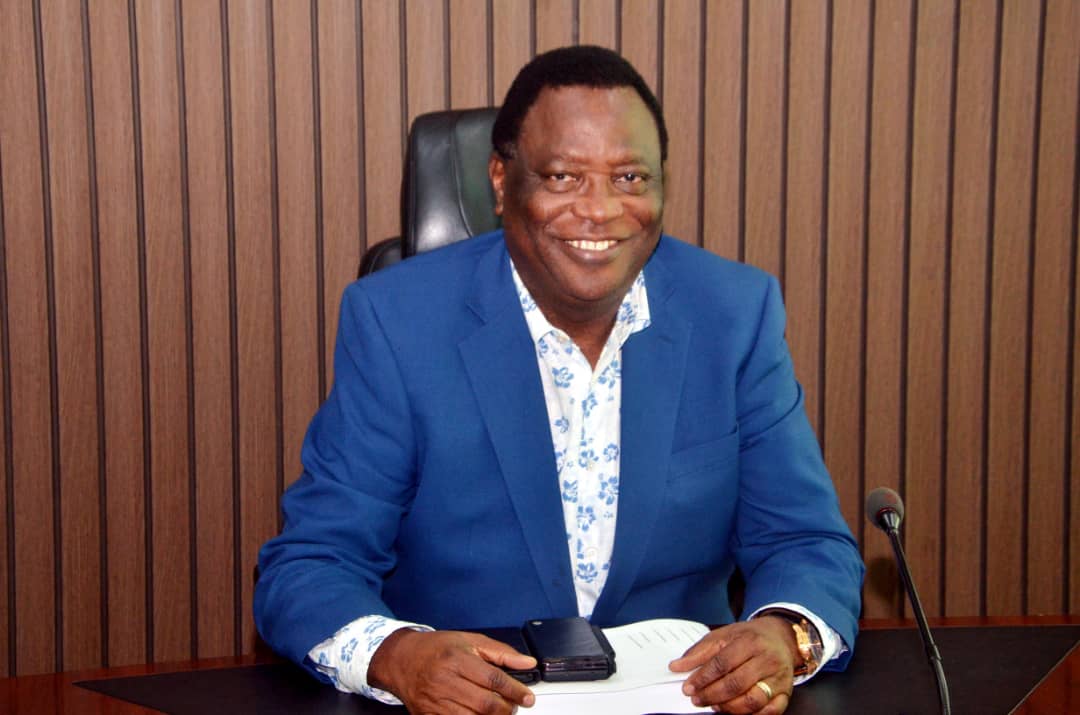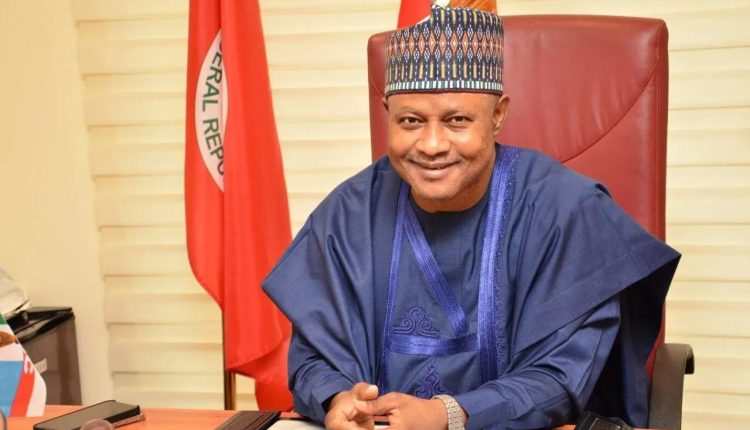Tinubu confers GCON title on outgoing Afrexim bank chief Benedict Oramah
President Bola Tinubu Friday in Abuja conferred the national honour, Grand Commander of the Order of the Niger (GCON), on President and Chairman of the Board of Directors of African Export-Import Bank, Benedict Oramah, for his outstanding contributions to development of Africa, particularly prioritising Nigeria’s interests.
The president gave the surprise recognition to Mr Oramah at the 32nd Annual Meetings of the Bank, appreciating his leadership role in expanding trade on the continent by leveraging opportunities, integrating and streamlining payment systems, and facilitating development projects for both the private and public sectors.
“Today is your day, Prof Oramah. I have listened to the accounts and reports you read eloquently, which also consist of lessons for us, your friends.
“I have the honour and privilege of conferring on you one of the highest recognitions of our country, Grand Commander of the Order of the Niger (GCON),” he said.
President Tinubu noted that this year’s meeting theme—”Building the Future on Decades of Resilience”—was timely and profound.
“Afrexim Bank, under Professor Benedict Oramah’s steadfast leadership, has grown its assets from $5 billion to over $37 billion. His decade of leadership saw the Bank champion Africa’s pandemic response, drive industrialisation, and support the AfCFTA and the continent’s creative economy. His legacy is one of generational impact,” he added.
Mr Oramah, who was one of the pioneering leaders of the institution in 1993, served as President/Chairman of the Bank for ten years, with record interventions in facilitating funds for 400 million vaccines to halt spread of Covid-19 in Africa, supporting agricultural development, healthcare projects and energy, including the Dangote Refinery.
Mr Tinubu noted that Nigeria benefited from more than $52 billion in support from the Afrexim Bank.
“Nigeria has proudly benefited from over 52 billion dollars in support, directed into energy, agriculture, infrastructure, manufacturing, healthcare, and creative industries. Flagship projects such as the Dangote and BUA Refineries, the African Medical Centre of Excellence, and the Africa Quality Assurance Centre embody confidence in Nigeria’s future and Africa’s potential.
“This partnership extends beyond capital. Nigeria’s formal approval of the Pan-African Payment and Settlement System (PAPSS) is a significant step towards financial independence. PAPSS enables cross-border trade in local currencies, reducing reliance on foreign exchange and promoting economic stability. I urge all African nations to embrace PAPSS because deeper financial integration strengthens our collective resilience,” he added.
The president said Afrexim Bank was born from Africa’s resolve to own its development since 1993, with over $250 billion mobilised for trade and development and $140 billion in the last decade alone.
“Nigeria’s collaboration with Afrexim Bank is expanding in scope and ambition. Together, we are launching the Africa Energy Bank, headquartered in Abuja, with $5 billion in initial capital to finance Africa’s energy transition—leveraging gas, renewables, and clean technologies.
“We are scaling our fertiliser sector to 7.5 million tonnes annually, supported by Afrexim Bank, positioning Nigeria as Africa’s fertiliser hub and ensuring food security for the continent. Meanwhile, transformative projects such as the $3.5 billion Bakassi Deep Seaport enhance trade infrastructure and market access.
“Through platforms like FEDA, AQAC, CANEX, and PAPSS, our partnership with Afrexim Bank is not just about financing. It’s about fostering African entrepreneurship, elevating quality standards, and scaling SMEs in creative and export-driven industries. Afrexim Bank is a strategic partner in co-creating the institutions, infrastructure, and innovations that will define Africa’s economic future,” he stated.
President Tinubu highlighted some of the Nigerian economy’s gains through repositioning in the last two years.
“Since May 2023, my administration has, under the Renewed Hope Agenda, advanced tough but necessary reforms rooted in macroeconomic stability, inclusive growth, and restored productivity. We removed the long-standing fuel subsidy and unified our exchange rate system.
“These reforms, though difficult, were essential to correcting systemic distortions. The results of our efforts are clear and promising, providing a strong foundation for our future endeavours. We have made significant strides in various sectors, and these achievements should fill us all with optimism for what lies ahead.
“In 2024, Nigeria recorded 3.4 per cent GDP growth with broad sectoral contributions. Oil production rebounded to 1.5 million barrels per day with a 2.5 million target in view, supported by strategic investment deals like the $1.2 billion CNCEC agreement.
“Inflation is easing, the naira is stabilising, investor confidence is recovering, and debt servicing has declined from 96 per cent to below 65 per cent of revenue. Tax reform is also underway, with the passage of four tax bills by the National Assembly, which I signed into law a few days ago,” the president noted.
President Tinubu said fundamental transformation was recorded in empowering citizens and thriving enterprises, with over 100,000 Nigerians accessing the new national consumer credit scheme.
The president noted that 400,000 more Nigerians have been queued for the next phase of the scheme,
“Our landmark student loan programme ensures no child is denied higher education due to financial hardship.
“We have spent N45.9 billion in healthcare to upgrade 8,800 primary health centres, improving maternal care and diagnostics in neglected communities. We are deploying thousands of fibre-optic cables for digital inclusion to bridge connectivity gaps and power innovation.
“Over 279 roads have been completed on infrastructure, with 65 under construction and 260 rural road interventions executed. Major arteries like the Lagos–Calabar Coastal Highway, Sokoto-Badagry Superhighway and the Abuja–Kaduna–Kano Road are reshaping national logistics and regional integration,” the president stated.
President Tinubu urged African leaders in the public and private sectors to work towards greater integration and streamlining of payment systems, trade facilitation, and partnerships for regional development.
“As the world becomes increasingly fragmented—with rising protectionism and shifting trade dynamics—Africa must double down on its institutions and capabilities. Afrexim Bank, backed by committed member states, must remain agile, bold, and grounded in African realities.
“In closing: Let us fully adopt PAPSS to reduce costs, conserve foreign reserves, and empower SMEs. Let us strengthen financial support to Afrexim Bank to scale its transformational impact. Let us treat intra-African trade not as a goal but as a strategic pathway for growth, jobs, and industrial value chains.
“Let us empower youth, women, and entrepreneurs as beneficiaries and architects of a new African century. The world will not wait for Africa; a united and purposeful Africa can define its destiny,” he said.
In his remarks, the Coordinating Minister of the Economy and Minister of Finance, Wale Edun, thanked the president for approving hosting the 32nd annual meeting in Abuja.
Mr Edun thanked Afrexim Bank for opening the African Trade Centre in Abuja, an excellent global medical centre, and supporting the private sector.
Presenting his ten-year report, Mr Oramah said, “I gave the job the best of my energy, talent and intellect.”
He said over $120 billion was invested in Africa in 2020 and commended shareholders for reinvesting 50-70 per cent of their $1.35 billion dividend in the bank.
Mr Oramah projected a $250 billion growth for the bank in the next ten years, following the institutionalisation of corporate governance that had earned trust.
The event was attended by former President Olusegun Obasanjo, former President of Ghana, Nana Akufo-Ado, former President of Senegal, Machy Sall, former President of Niger, Mahamadou Issoufou, and former Vice Presidents, Namadi Sambo and Yemi Osinabjo.
Bayo Onanuga
Special Adviser to the President
(Information & Strategy)













